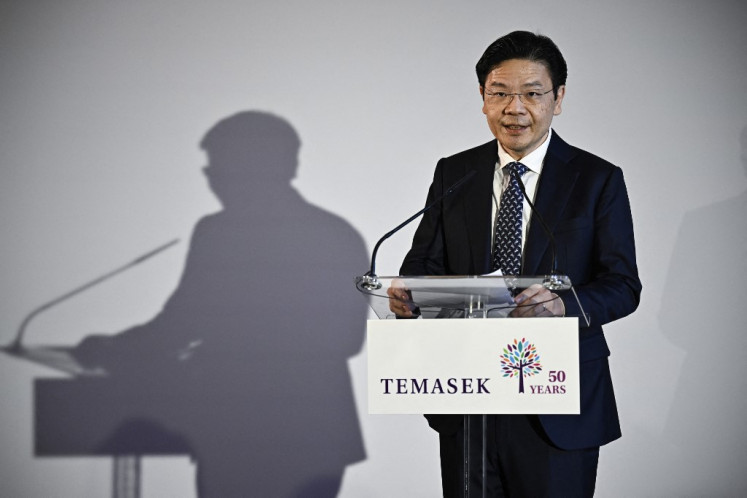Muslim students encouraged to help curb Islamophobia
Young messengers: Deputy Foreign Minister Mohammad Fachir (holding phone) takes a picture with students of the Ali Maksum Islamic boarding school in Yogyakarta after delivering a speech on Indonesia’s foreign policy promoting peaceful Islam
Change Size

Y
span class="inline inline-center">Young messengers: Deputy Foreign Minister Mohammad Fachir (holding phone) takes a picture with students of the Ali Maksum Islamic boarding school in Yogyakarta after delivering a speech on Indonesia’s foreign policy promoting peaceful Islam.(JP/Agnes Anya)
In his adolescence, Bahrul Ulum feels discomfort about Islam often being associated with radicalism and terrorism by much of the world — a topic currently addressed by the Foreign Ministry as a public diplomacy measure.
The 16-year-old high school student has been seeing and hearing news showing Muslims regarded as enemies internationally.
Meanwhile, Bahrul is learning every day that Islam serves as rahmatan lil ‘alamin (a blessing for the universe) at the Mu’allimin Islamic School in Yogyakarta.
“Why is Islam always linked to radicalism? Why do people abroad see Muslims as terrorists? Not all terrorists are Muslims,” Bahrul said recently to Deputy Foreign Minister Muhammad Fachir.
The same concern has become the ministry’s focus in conducting public diplomacy and for that reason Fachir made an official visit to two pesantren (Islamic boarding schools) in Yogyakarta, namely the Mu’allimin and Ali Maksum schools, which are managed by Indonesia’s two largest Islamic organizations, Muhammadiyah and Nadhlatul Ulama, to disseminate Indonesia’s foreign policies and focuses.
The two-hour visits, which featured keynote speeches by and discussions with Fachir, were part of the ministry’s attempt to nurture interfaith tolerance in Indonesia, the deputy minister said.
“This tolerance must not be taken for granted. There must be constant attempts to uphold this value,” he said after the visits on Friday.
During the visits, Fachir told Bahrul and dozens of others students that hatred toward Muslims, as well as the association with terrorism and radicalism, was caused by Islamophobia. In turn, he said, Islamophobia existed because many terrorists had used Islam as their excuse to spread fear and violence.
Adverse views of Islam, he said, could not be avoided when “many terrorists shouted Allahu Akbar [God is great] when they were going to detonate the bombs.”
However, Indonesian Muslims could take part in changing that perception by showing that Islam teaches nothing but love, Fachir told the Mu’allimin students, who raised their hands in enthusiasm to ask various questions about foreign policies and issues.
“We need to change the view [by showing] that Islam is assalam [peaceful], rahmattan lil alamin,” he said. “If there’s anyone saying Islam is radical, we must say that our religion promotes love.”
In the Ali Maksum boarding school, Fachir said that Muslim youths played an important role in eradicating radicalism, as well as other “deviant ideologies”.
Muslim youngsters, he said, should not see believers of other religions in Indonesia as competitors.
Instead, as the majority, they should show that Islam was tolerant and got along well with other faiths.
Meanwhile, Mu’allimin director Aly Aulia said Fachir’s lecture had brought a new perspective to the students, who had been craving for discussions about the topic.
He, however, suggested that when conducting such an event, the ministry should bring attractive visual aids suitable for santri or pesantren students.
“Next time, it would be good if there are also reading materials, posters, comic books, or other materials tailored for students,” Aly told The Jakarta Post, adding that the issues must be simplified so that students could better understand the topics.
“If there are materials that could be brought home, there would be more interaction.”
Aside from such school visits, the Foreign Ministry has been also conducting another public diplomacy measure on the issue through a student exchange program called Outstanding Youth for the World.
This year, the ministry sent 18 youngsters, including 10 santri, from various cities, such as Manado in North Sulawesi, Jombang in East Java, Kudus in Central Java and Tasikmalaya in West Java to Australia.
Those students had on Saturday the opportunity to meet President Joko “Jokowi” Widodo on the sidelines of the ASEAN-Australia Summit in Sydney.
The youngsters had a morning walk around the Royal Botanic Garden, just next to the Sydney Opera House.
Separately, Azis Nurwahyudi, the ministry’s public diplomacy director said that the santri were expected to demonstrate to Australians Indonesia’s interfaith tolerance while broadening their views about the world.
“Many of the participants came from small towns and had little knowledge about other countries. With the program, we expect them to broaden their views and, hence, they could further promote our interfaith tolerance,” he told the Post.









